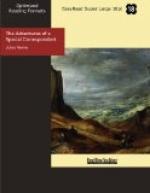“We should never put off until to-morrow what we can do to-day.”
“Yes, I know, time is money.”
“No! Time is time, simply, and I do not care to lose a minute of it.”
Ephrinell clasped my hand, and as I had promised, I went to take the necessary steps regarding the witnesses necessary for the nuptial ceremonial.
It needs not be said that the commercials were of full age and free to dispose of themselves, to enter into marriage before a clergyman, as is done in America, and without any of the fastidious preliminaries required in France and other formalistic countries. Is this an advantage or otherwise? The Americans think it is for the best, and, as Cooper says, the best at home is the best everywhere.
I first asked Major Noltitz, who willingly agreed to be Miss Bluett’s witness.
“These Yankees are astonishing,” he said to me.
“Precisely because they are astonished at nothing, major.”
I made a similar proposition to Pan-Chao.
“Delighted, Monsieur Bombarnac,” he replied. “I will be the witness of this adorable and adored Miss Bluett! If a wedding between an Englishwoman and an American, with French, Russian and Chinese witnesses, does not offer every guarantee of happiness, where are we likely to meet with it?”
And now for Caterna.
The actor would have consented for any number of weddings.
“What a notion for a vaudeville or an operetta!” he exclaimed. “We have the Mariage au tambour, the Mariage aux olives, the Mariage aux lanternes—well, this will be the Mariage en railway, or the Marriage by Steam! Good titles, all those, Monsieur Claudius! Your Yankee can reckon on me! Witness old or young, noble father or first lover, marquis or peasant, as you like, I am equal to it—”
“Be natural, please,” said I. “It will have a good effect, considering the scenery.”
“Is Madame Caterna to come to the wedding?”
“Why not—as bridesmaid!”
In all that concerns the traditional functions we must have no difficulties on the Grand Transasiatic.
It is too late for the ceremony to take place to-day. Ephrinell understood that certain conventionalities must be complied with. The celebration could take place in the morning. The passengers could all be invited, and Faruskiar might be prevailed on to honor the affair with his presence.
During dinner we talked of nothing else. After congratulating the happy couple, who replied with true Anglo-Saxon grace, we all promised to sign the marriage contract.
“And we will do honor to your signatures,” said Ephrinell, in the tone of a tradesman accepting a bill.
The night came, and we retired, to dream of the marriage festivities of the morrow. I took my usual stroll into the car occupied by the Chinese soldiers, and found the treasure of the Son of Heaven faithfully guarded. Half the detachment were awake and half were asleep.




